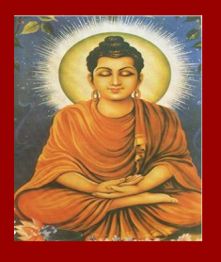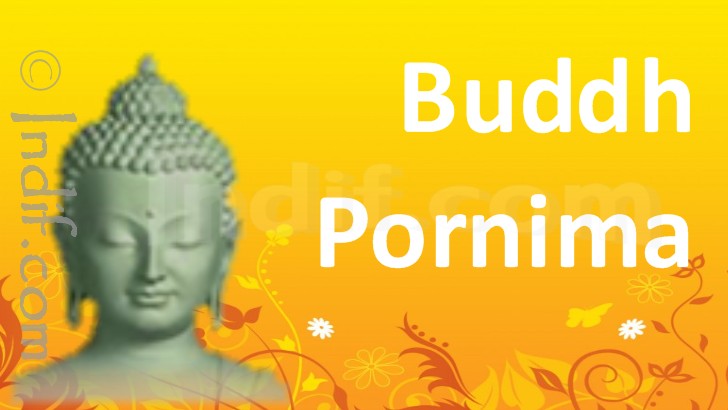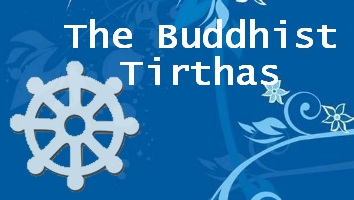Buddha Poornima also known as Buddha Jayanti is the most sacred festivals of Buddhist. Buddha Poornima is celebrated in remembrance Lord Buddha. It falls on the full moon night in Vaisakha (according to the Hindu calendar that usually falls in April or May).Lord Buddha was the founder of the Buddhist religion and is said to be the ninth avatar of Vishnu. It was on Buddha Poornima that the three important events of Buddha's life took place i.e. his birth, his enlightenment and his death (nirvana). It is believed that Gautama Buddha obtained Enlightenment and passed away on the same day. Buddha Purnima is also known as Buddha Jayanti, Vesak, Vaishaka and Buddha�s Birthday.
The Divine Life of Gautam Buddha:
 |
The Buddha was born as Siddhartha Gautama in 563 BC. He was an actual historical figure, a prince of the Shakalyas, the people of a small state bordering modern India and Nepal. He lived in a time of prosperity and social up heal. At the age of sixteen, Siddhratha married a beautiful woman and the had a son. The turning point in his life came when Siddhartha was twenty-nine and he ventured outside the palace grounds. He was caught by the sufferings of the world (old age, sickness and death), left his wife, son and riches to become a wandering ascetic in the search for enlightenment. He wandered to many places and ultimately at the age of thirty-five he arrived at Bodh Gaya, where he sat beneath a tree. He swore that he would not rise until he had found enlightenment. After forty-nine days of solitary meditation he attained nirvana, the state of permanence. He thus became the Buddha "One who is fully Awake." |
Celebrations and Rituals:
The main celebrations of Buddha jayanti takes place in Bodh gaya. For Buddhists, Bodh Gaya is the most important pilgrimage site related to the life of Gautama Buddha. Bodh Gaya, the Shrine that marks the place of Budha's enlightment. Bodh Gaya is a small town in Gaya district of Bihar in India.
On this large number of Buddhist devotees from all over the world assemble to pay their respectful homage to Lord Buddha. Besides decorating the temple and area around with colorful Buddhist flags, Buddhists decorate their houses with lights, candles and diyas. After the morning prayer, colorful procession of the Monks, worship with large offerings, distribution of sweets and snacks takes place.
In other places Prayers, sermons and non-stop recitations of Buddhist scriptures resonate in monasteries, religious halls and homes. On this day the Buddhists bathe and wear only white clothes. People offer incense, flowers, candles and fruits to the statue of Lord Buddha. The Mahabodhi tree, also known as the "pipal-tree" or the sacred fig tree is worshipped and offered offerings too. This is known to be the tree under which Buddha attained enlightenment. Conventionally, Buddhists are pure vegetarians. Those who are non-vegetarians do not take meat on this day. Kheer, a sweet-dish, is prepared at homes. Freeing of birds from cages is also a practice followed many places. They spend their entire day listening to discourses on the life and teachings of the Buddha.
Teachings of Buddha:
The primary teachings of Buddhism are the Four Noble Truths, the Eightfold Path and the Precepts.
Four Noble Truths : The Four Noble Truths are the foundation of Buddhism. The Buddha's first sermon after his Enlightenment centered on these Four Noble Truths -
- All human conditions lead to suffering;
- Suffering has a cause;
- That cause is craving,or, desire,
- There is a path for the cessation of suffering.
The Eightfold Path: The Fourth Noble Truth is the Eightfold Path, or eight areas of practice that touch all aspects of life.
- Right Belief (in the Truth)
- Right Intent (to do good rather than evil)
- Right Speech (avoidance of untruth, slander and swearing)
- Right Behaviour (avoid blameworthy behaviours)
- Right Livelihood (some occupations e.g. butcher, publican, were disparaged!!!)
- Right Effort (towards the good)
- Right Contemplation (of the Truth)
- Right Concentration (will result from following the Noble Eightfold Path)
The Precepts: Buddhism believes that a person can begin to move in the right direction by taking total 'refuge'. That is by making a confession of faith in the Buddha, his teachings, and his monastic order. And, also, by adopting five fundamental moral precepts:
- Not killing
- Not stealing
- Not misusing sex
- Not lying
- Not abusing intoxicants
Words have the power to both destroy and heal. When words are both true and kind, they can change our world.
- BuddhaNeither fire nor wind, birth nor death can erase our good deeds.
- BuddhaAn insincere and evil friend is more to be feared than a wild beast; a wild beast may wound your body, but an evil friend will wound your mind.
- BuddhaHave compassion for all beings, rich and poor alike; each has their suffering. Some suffer too much, others too little.
- Buddha







